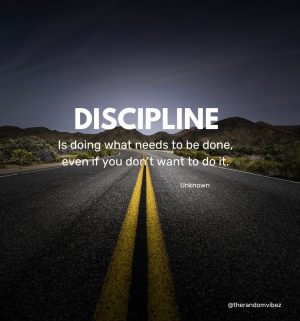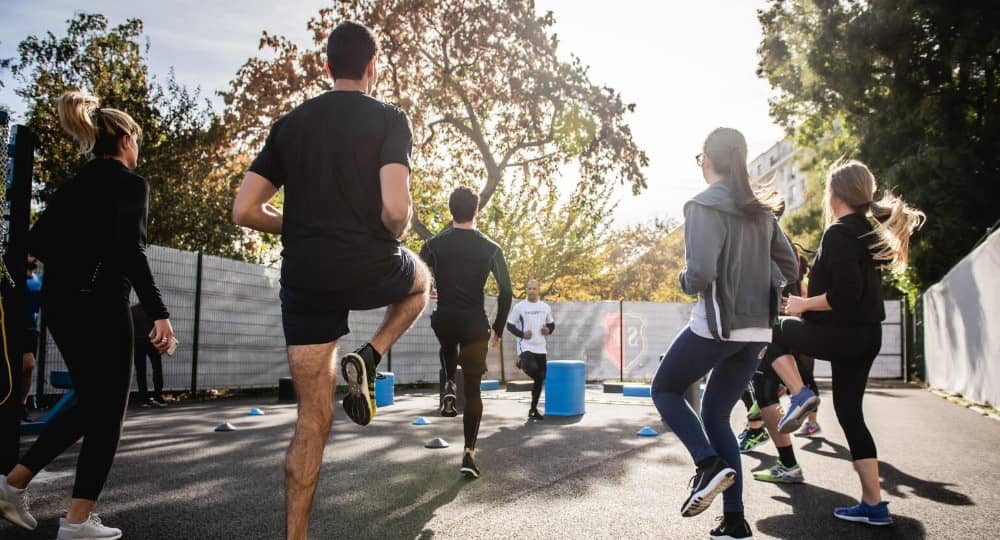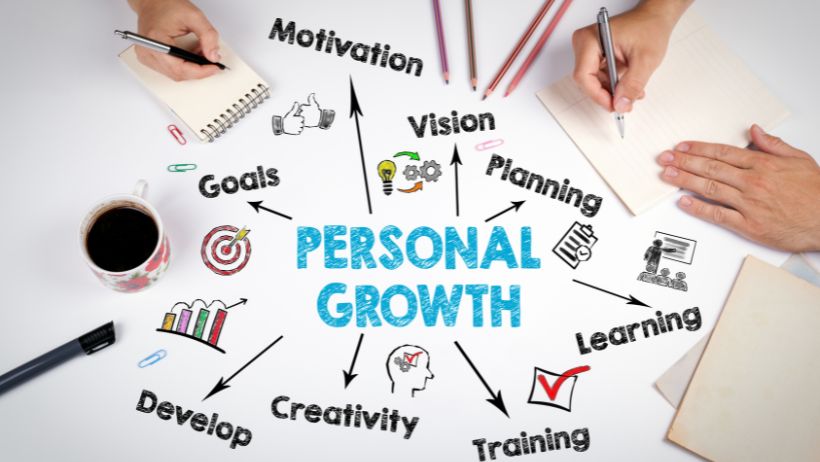Wondering how to discipline yourself? One of the most important life skills to develop self-discipline, for those just starting in life! Discipline isn’t just a habit; it’s a conscious choice and a mindset that we adopt.
And developing discipline is a gradual process that involves cultivating positive habits and mindset.
“Nothing changes if you don’t change.” – This statement is often attributed to Albert Einstein and is a reminder that personal growth and change start with one’s self and taking the initiative to make a change.
Reflecting on the past, I realize there was a time when I lived life solely based on my mood, lacking any structured routine. Looking back, it’s evident that during those 2-3 years of my youth, I missed out on numerous opportunities for personal growth and achievement. My laid-back approach hindered my progress.
But now as I have transitioned into a more disciplined lifestyle, I see the remarkable transformation in my life. Embracing a structured routine and adhering to daily discipline has been a game-changer.
Adhering to deadlines and maintaining a consistent routine has significantly improved my time management. This disciplined approach not only streamlined my efficiency but also afforded me a surplus of time.
It’s not just about the tangible accomplishments, but also the profound positive shift in my mindset, productivity, and overall well-being.
This change serves as a powerful reminder that implementing discipline in our lives can unlock incredible potential and pave the way for a more fulfilling future.
There are 2-3 books on discipline that changed my perspective on life. “The Power Of Discipline” by Daniel Walter and “Atomic Habits” by James Clear that I will recommend to people who need a push to a more disciplined lifestyle
What Is Self-Discipline?
Self-discipline is the ability to control one’s thoughts, emotions, and actions. It involves setting goals, prioritizing tasks, and following through on commitments in a consistent and focused manner.
Being disciplined requires willpower, motivation, and perseverance, and can lead to increased success and satisfaction in personal and professional areas of life.
It helps individuals resist temptations, overcome procrastination, and maintain focus on their long-term goals.
Self-discipline is a learned skill and can be improved through daily practice and positive self-reinforcement.

Self-Discipline Vs Motivation
As the popular saying states; “Motivation is temporary discipline lasts forever.”
This quote highlights the difference between motivation and discipline. Motivation can come and go, but discipline remains constant.
A person who is disciplined can continue working towards their goals even when they don’t feel motivated because discipline has become a habit.
By focusing on building self-discipline, one can achieve long-term success, whereas relying solely on motivation may lead to inconsistent results.
Importance of Self-Discipline In Life
Self-discipline is the ability to control one’s actions and impulses and make choices that align with one’s values and goals.
It involves setting priorities, avoiding distractions, and following tasks even when faced with obstacles or temptations. The importance of self-discipline in life can be seen in several ways:
- Achieving goals: Without self-discipline, it is difficult to stick to a plan or reach a desired outcome. Self-discipline helps individuals set goals, make a plan, and follow through on that plan.
- Improving productivity: Self-discipline allows individuals to focus on tasks and avoid distractions, leading to increased productivity and efficiency.
- Building resilience: By demonstrating self-discipline, individuals can develop their willpower and mental toughness, which can help them overcome challenges and setbacks.
- Enhancing personal growth: Discipline is key to personal growth and self-improvement, as it helps individuals take charge of their own lives and develop positive habits.
- Improving relationships: Self-discipline can also benefit relationships, as individuals are able to keep their promises and commitments to others and maintain healthy boundaries.
8 Tips On How To Build Self-Discipline
Discipline is a crucial component of success in various aspects of life, such as personal development, education, career, and relationships.
It involves setting goals, sticking to them, and avoiding distractions or temptations that can derail progress. Building self-discipline requires consistent effort and a clear understanding of why it is important.
These simple and effective tips will help you to be on track and reach your full potential by following your daily routine. Here are some steps that can help:
1. Define Your Goals
Start by defining what you want to achieve in life, be it long-term or short-term goals. Knowing what you want to accomplish will give you direction and motivation to work on self-discipline.
2. Healthy Habits
Developing healthy habits is a key component of self-discipline and can greatly improve one’s physical, mental, and emotional well-being.
Implementing habits such as regular exercise, a balanced diet, adequate sleep, and reducing stress through activities such as meditation or mindfulness can lead to improved overall health.
Furthermore, consistently sticking to a routine and avoiding unhealthy habits such as smoking or excessive alcohol consumption demonstrate discipline and a commitment to personal growth.
By combining self-discipline with healthy habits, individuals can achieve their goals and live fulfilling life.
3. Create a Routine
Establishing a daily routine can help establish a sense of structure and discipline. Start with small tasks and gradually build up to more complex ones. I started by outlining simple tasks that I could easily integrate into my day.
These included activities such as making my bed, doing a morning workout, and dedicating a few minutes to mindfulness. And with time as I became accustomed to these initial steps, gradually introduced more intricate tasks into my routine.
This progression allows you to adapt at a comfortable pace, making the transition to a more disciplined lifestyle smoother. Remember, the key is to build a routine that is realistic and sustainable.
By incorporating small, meaningful tasks and staying committed to your schedule, you’ll find that discipline becomes a natural and integral part of your everyday life.
4. Avoid Procrastination
Procrastination, the habit of delaying tasks, can result in missed opportunities and increased stress. Overcoming this challenge requires the cultivation of self-discipline.
Discipline enables individuals to resist the allure of immediate gratification, prioritize effectively, and stay focused on long-term objectives.
By embracing small, consistent steps such as breaking tasks into manageable portions and setting realistic deadlines, one can combat procrastination and establish a more disciplined and productive approach to daily responsibilities.
Don’t let distractions and temptations lead you astray. Keep your focus on your goals and prioritize the tasks that need to be done.
Try to tackle the most important tasks first thing in the morning when your energy and motivation are highest. By developing self-discipline and breaking the cycle of procrastination, you will take one step closer to success.
5. Practice Self-Reflection
Take time each day to reflect on your progress, evaluate your strengths and weaknesses, and set new goals as needed. This will help you stay on track and continue to build self-discipline.
6. Surround Yourself with Positive People
Positive people can provide support and encouragement, helping you maintain your focus and motivation. Seek out people who share your goals and values and who can help you stay on track.
7. Stay Motivated
Keep your goals in mind and remember why you started working on self-discipline. Reward yourself for your accomplishments, no matter how small they may be.
8. Consistency Is The Key
Building self-discipline takes time and consistent effort. Don’t be discouraged if you slip up or make mistakes. Instead, focus on learning from your experiences and moving forward.
In conclusion, self-discipline is not about being perfect or never making mistakes, but about making a conscious effort to be in control of our behavior and reach our goals.
Self-discipline takes time to develop, but with persistence and perseverance, anyone can cultivate this important skill. By incorporating self-discipline into our lives, we can live a more fulfilling and purposeful existence.
Discipline In Student’s Life
Think of discipline as the secret sauce for students—it keeps everything running smoothly. It’s like a trusty GPS helping you navigate through studies, activities, and personal stuff.
With discipline, you build solid study habits, meet deadlines, and stay organized. It’s your buddy, making sure you stay strong and responsible as you tackle school challenges.
I feel, that nurturing discipline in kids from their early years is akin to providing them with life’s compass. It’s about planting seeds of responsibility, respect, and self-control that will blossom over time.
Through consistent routines, good habits, and positive encouragement, children absorb essential life skills that will help them in all aspects of their lives, be it work, school, relationships or life.
This early introduction to discipline becomes the cornerstone, helping them face challenges with resilience and instilling a positive framework that shapes their character as they journey through life.
Discipline isn’t just a tool for success; it’s the cool guide that helps you reach your future goals.
Feel free to share with friends and family on Facebook, Tumblr, Twitter, Instagram, WhatsApp, and more to extend your support to your loved ones.





